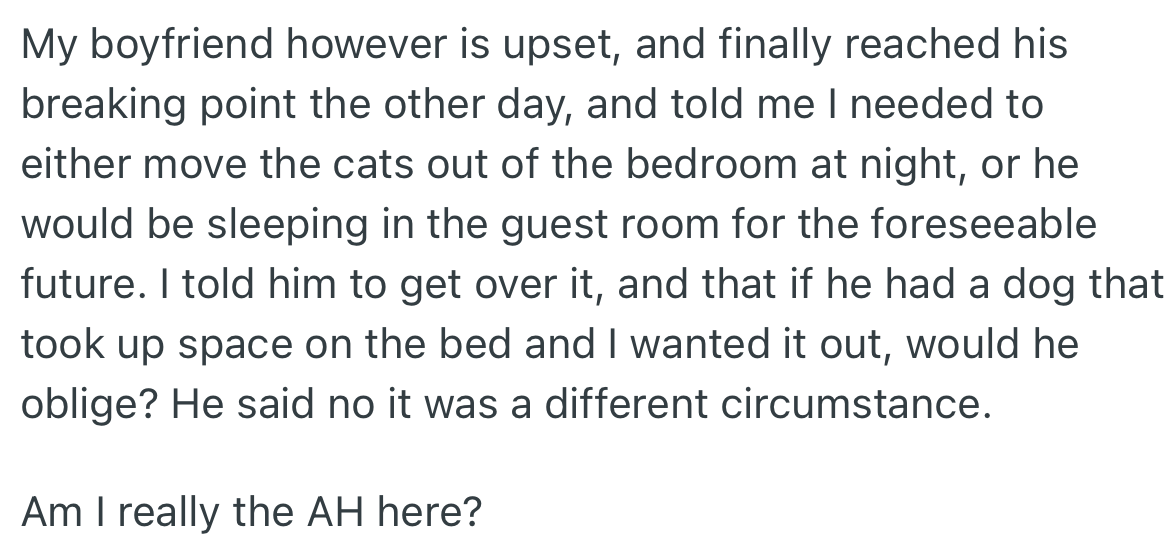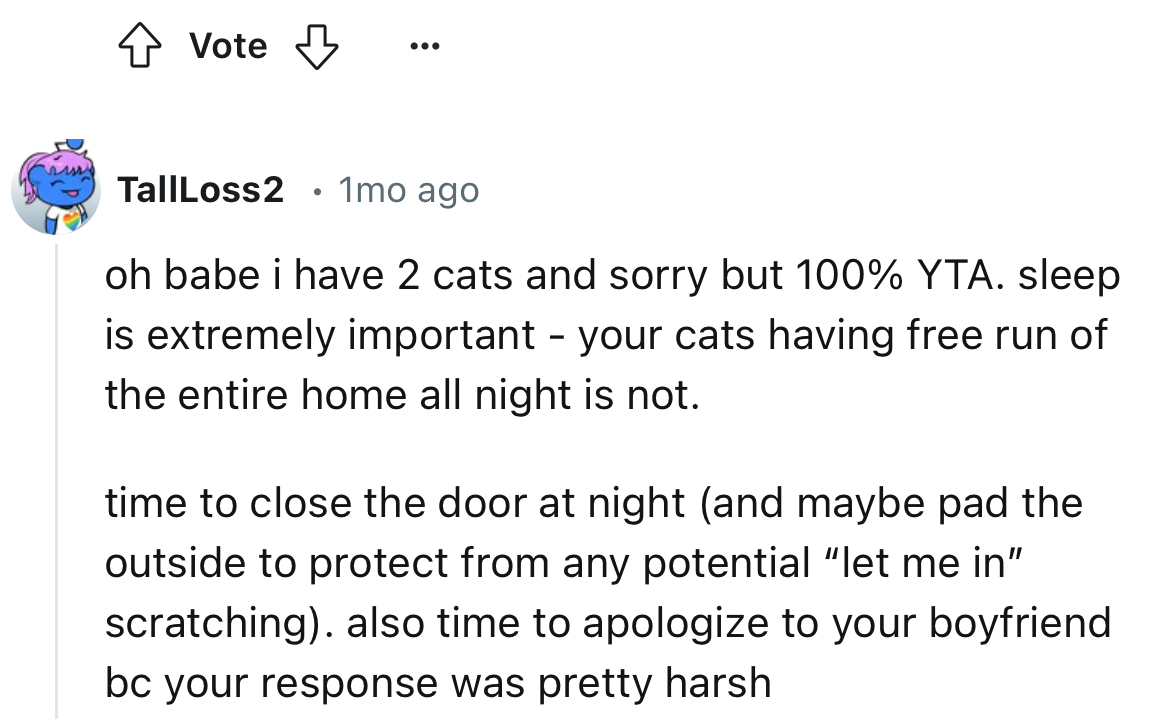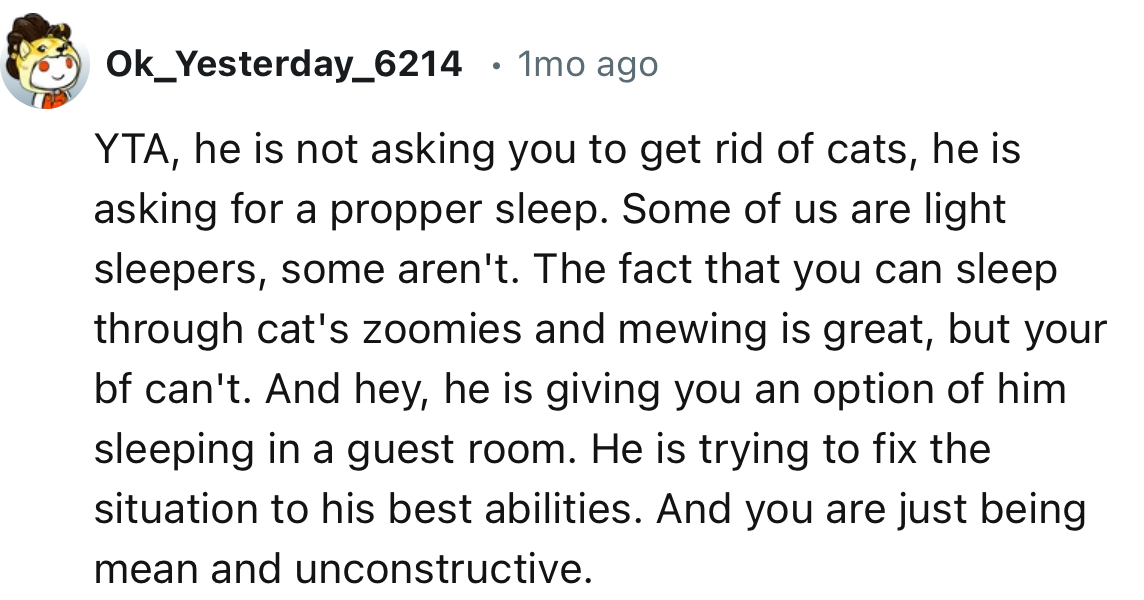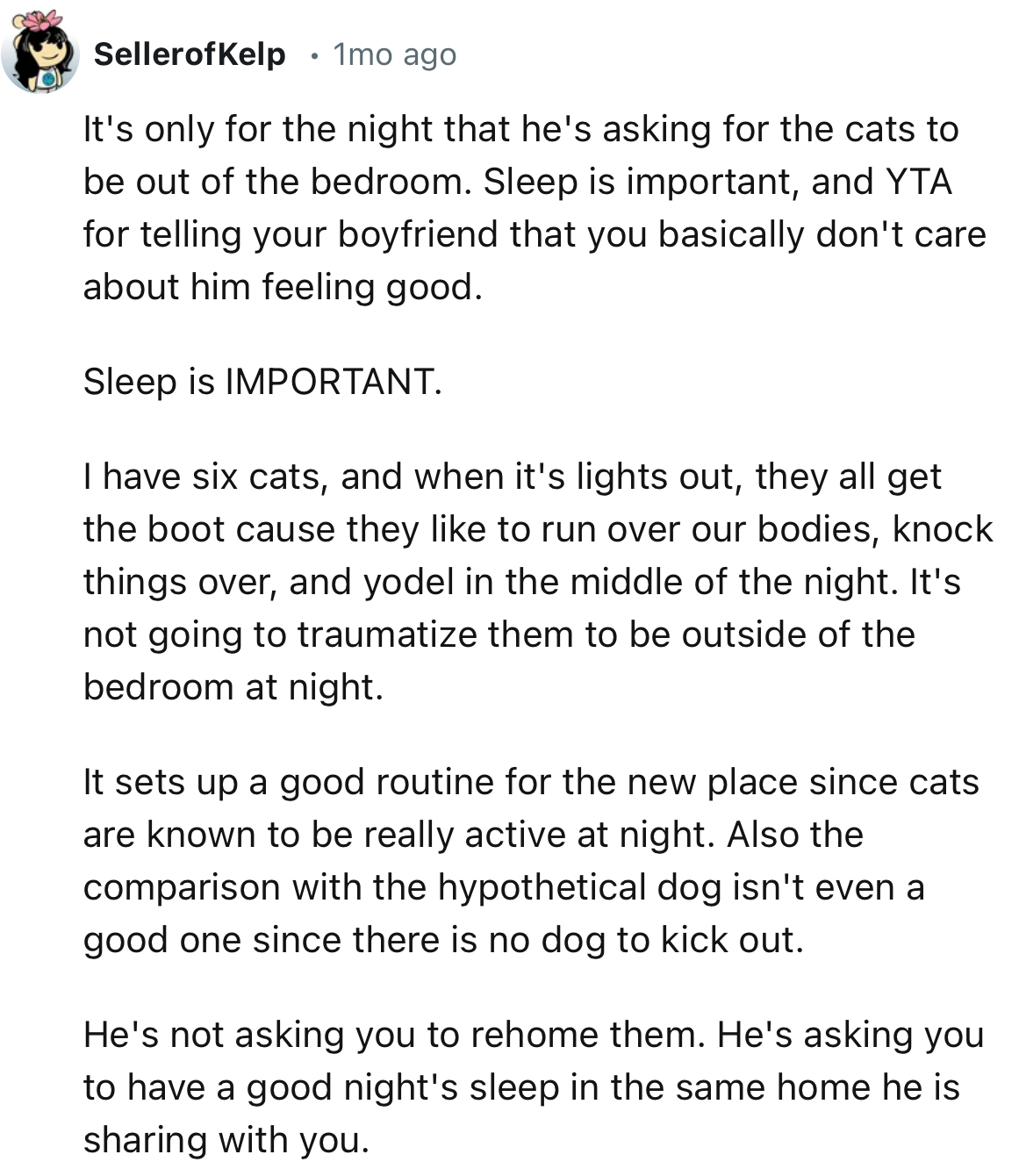Boyfriend Threatens To Move Out Of Bedroom Over Girlfriend’s Cats' Noisy Antics At Midnight
When OP (Original Poster) moved in with her boyfriend after a year and a half of dating, she brought along her two beloved cats. Interestingly, her boyfriend doesn't have any pets of his own but grew up with dogs.
During their time at OP's apartment, the cats were wary of her boyfriend, preferring to avoid the bedroom when he was around.
However, with the recent move to their shared home, the cats had finally accepted the new living arrangement, reclaiming their spot in the bedroom. As any cat owner knows, this meant the occasional midnight zoomies and unpredictable meowing at odd hours. While OP was used to this feline behavior, her boyfriend was not.
The breaking point came when her boyfriend, frustrated by the nightly disruptions, gave OP an ultimatum: either the cats stay out of the bedroom at night, or he would relocate to the guest room indefinitely.
OP, standing her ground, told him to get over it. She argued that if the roles were reversed, and he had a dog that took up bed space, she wouldn't demand that the dog be moved. He countered, saying it was a different situation.
Feeling caught between her partner and her pets, OP questioned whether she was being unreasonable. After all, she had lived with her cats long before her boyfriend came into the picture.
Was she the one at fault for expecting her boyfriend to adjust to her cats' quirks, or was her boyfriend being unfairly rigid?
Let’s dig into the details

OP has two cats while her boyfriend has no pets. Upon moving in with him, OP brought her cats.

Understanding Noise Sensitivity
Noise sensitivity can be a significant stressor in relationships, particularly for individuals who are easily disturbed by sounds. Research in environmental psychology shows that noise can affect mood and cognitive function, leading to increased irritability and stress.
Studies published in the Journal of Environmental Psychology indicate that individuals with heightened sensitivity to noise may experience anxiety and discomfort in environments that others find tolerable.
OP’s cats became comfortable in their newfound place and would come into the bedroom she shares with her boyfriend.

OP’s boyfriend became upset with the cats in the room and their strange behavior at night. He requested that OP move them out of the room, or he would find another sleeping space for himself.

This sensitivity can create tensions in relationships, especially when one partner's needs conflict with the other's preferences. According to psychological research, effective communication about personal boundaries and sensitivities is crucial for maintaining harmony in relationships.
Couples who engage in honest discussions about their needs are more likely to find solutions that work for both parties.
Check out some interesting comments below:

“The fact that you dismiss his ideas so easily says a lot about the problem-solving and arguments in the future.”

The Role of Compromise
Compromise is a vital skill in navigating relationship challenges, particularly when it comes to differing preferences regarding noise levels. Research suggests that successful compromise involves understanding each partner's perspective and finding common ground.
Studies in the Journal of Social Issues show that couples who prioritize compromise tend to have stronger, more satisfying relationships.
“All there is, is your cats. Your argument is based on a hypothetical that doesn't exist.”

“A relationship is about compromise, and he isn’t asking you to get rid of them but simply to stop them from being in the bedroom at night.”

Being willing to adapt one’s behaviors for the sake of the relationship can lead to greater emotional intimacy. Research indicates that flexibility in adjusting to one another's needs fosters connection and understanding, essential components for healthy relationships.
By practicing compromise, couples can create a supportive environment that enhances both partners' well-being.
“If you don't do something soon to fix your mess, you might find that he makes the cats disappear while you're out.”

“The fact that you can sleep through the cats' zoomies and mewing is great, but your boyfriend can't.”

The Reddit community largely sided with OP's boyfriend, feeling she was being unreasonable.
They stressed how crucial a good night’s sleep is and suggested that keeping the cats out of the bedroom might be a fair compromise.
We'd love to get your thoughts on this story. Join the conversation in the comments.
“You don't seem to grasp how very important good sleep is to one's health, both physical and mental.”

“Sleep is important, and YTA for telling your boyfriend that you basically don't care about him feeling good.”

Communicating Needs Effectively
Effective communication is key in expressing noise sensitivities without creating conflict. Psychological research emphasizes the importance of using 'I' statements to articulate personal feelings and needs.
According to studies in interpersonal communication, expressing oneself in a non-accusatory way can lead to more constructive conversations and reduced defensiveness.
Psychological Analysis
This situation highlights the importance of addressing individual sensitivities in relationships. Open communication and compromise are essential for maintaining a harmonious environment that respects both partners' needs.
Analysis generated by AI
Analysis & Alternative Approaches
In summary, navigating noise sensitivities in relationships requires effective communication and a willingness to compromise. By fostering an environment of understanding and collaboration, couples can enhance their emotional connection and overall relationship satisfaction.
Understanding the psychological factors at play can empower individuals to create healthier dynamics in their relationships.
Additionally, finding mutually agreeable solutions for managing noise can enhance the relationship's overall quality. Couples who work together to create a comfortable living environment often report higher satisfaction in their relationship.
Research shows that collaborative problem-solving can strengthen emotional bonds and improve relationship satisfaction.



